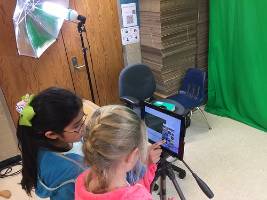
The authentic teaching of academic vocabulary encompasses many components, such as incorporating students' prior knowledge, using engaging strategies, and promoting student ownership and understanding. In this session, participants will explore and evaluate strategies that increase the authentic teaching... Read more »
Target Audience
Intention Or Purpose

This professional development session focuses on instilling an understanding of the frameworks of authentic learning as well as the SAMR (Substitution, Augmentation, Modification, Redefinition) model for technology. Participants will apply these practices to the authentic use of technology in their... Read more »

In this professional learning session, participants will engage in collaborative writing activities, discover how writing can increase student engagement, and leave with strategies and resources that can be implemented immediately in their classrooms. Read more »
Target Audience
Group Size
Intention Or Purpose

In this lesson, students will explore various types of expository writing. Students will experience the expository forms of description, sequence, comparison, cause/effect, and problem/solution writing through engaging tasks and collaborative activities and create an expository writing reference sheet... Read more »
Expository Writing
Grade Level
Subject
Standards

Elements of an Essay
Grade Level
In this lesson, students will engage in multiple independent and group strategies to both identify and analyze essential structural elements of an essay. By doing this, students will both practice and gain a clearer perspective of how to write with greater clarity and effectiveness. Read more »
Subject
Course
Grade Level
Standards

Students will explore the cultural characteristics that appear in various versions of the story "Little Red Riding Hood." Additionally, students will compare and contrast how the cultural characteristics appear in each story and how American authors have revamped the story to mirror popular culture... Read more »
Cultural Characteristics
Grade Level
Subject
Course
Standards

In this lesson, students will learn how to predict electron configuration and valence electrons by exploring patterns within the periodic table. Students will discover that elements are arranged in increasing order of their atomic number in the periodic table, and then the elements repeat their properties... Read more »
Introduction to Periodicity and Electron Configuration
Grade Level
Subject
Course
Standards

This lesson focused on the understanding of alternation of generations in plants, and began by examining non-vascular plants, including mosses and liverworts. It is intended for a botany or a phylogenic science class, and is not intended for introductory biology classes. Read more »
Alternation of Generations: Non-Vascular Plants
Grade Level
Subject
Course
Standards

Students will analyze the United States Supreme Court case of "Worcester v. Georgia," and summarize and categorize actions that protected or undermined the sovereignty of the Cherokee Nation. Students will extend their learning by watching a video of a judge discussing the powers of the judicial branch.... Read more »
Cherokee Sovereignty and Actions of the U.S. Government
Related
Subject
Course
Grade Level
Standards

This lesson is an introduction to polynomials. Solving polynomials is not included in this lesson, and would be the next lesson after this one. Academic language as well as patterns in polynomial family functions is explored. Prerequisite knowledge would be an understanding of functions and exponents... Read more »
Polynomials
Grade Level
Course
Subject
Standards

This lesson explores the impact of the Civil War and Reconstruction on the Five Tribes. Students will begin this lesson with a Word Splash activity to activate their prior knowledge about the Five Tribes' involvement in the Civil War. Next, students will explore the Reconstruction Treaties of 1866 (treaties... Read more »
The Reconstruction in Indian Territory
Subject
Course
Grade Level
Standards

Students will discuss and evaluate the importance of managing and reconciling a bank account. Using a scenario, students will create a fictitious bank account register. Students also will investigate various local banks' checking account policies and compare them. Finally, students will draw conclusions... Read more »
Standard 4: Managing a Bank Account
Grade Level
Subject
Course
Standards

There are a multitude of reasons why we offer thanks to others. Whether someone has done us a favor, given us a gift, shared their personal or professional time, or even just offered a kind word, thanking them with a sincere thank you note is a timeless and appreciated form of gratitude. A timely and... Read more »
Writing a Thank You Note
Subject
Course
Grade Level
Standards

Truth is a powerful thing. Sometimes it hurts, and sometimes it is hard to deliver. In this multi-genre lesson, students will analyze and compare three texts written on the subject of honesty. Students will determine the claim a text is arguing and the evidence and reasoning that is used to support... Read more »
Claim, Evidence, Reasoning
Grade Level
Subject
Standards

In this art lesson, students explore the history of mural art—the values and themes that informed artists in the format throughout history. Students will also see interviews with Oklahoma mural artists who speak on their creative process, the techniques they have used, and proposal writing. By the end,... Read more »
Mural Art History, Technique, and Concept Development
Grade Level
Subject
Course
Standards

